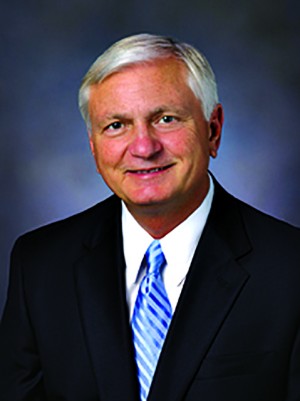PSC President Ed Meadows' note to staff re: performance funding
- July 28, 2015
- / Shannon Nickinson
- / education

Pensacola State College President Ed Meadows.
PSC President Ed Meadows sent this note to staff on Monday, July 27, regarding the college's performance on the State Board of Education's new performance based funding metrics:
To All Employees:
Last Thursday the State Board of Education approved a new performance based funding formula for Florida’s 28 state colleges that will control how the state allocates existing and new funding for these colleges. Each college receives a score based upon retention rates for students, completion rates for students, job placement or continuing education, and the entry-level wages for graduates. Colleges are then categorized as gold, silver, or bronze based upon the total score for each college. Pensacola State College is currently in the bronze category.
In any state other than Florida, we would be in the gold category. With graduation and retention rates well above the national average, job placement/transfers at 82 percent, and beginning wages in our service area competitive with overall average Florida wages, we at Pensacola State College find ourselves counting on our improvement plan to regain approximately $613,000 of our base budget. In short, all Florida colleges perform above national averages in retention and completion, but we are not being compared to the nation. Since Florida colleges are among the best, we are being compared to the best of the best.
Fortunately this year, performance based funding will not adversely impact our students. In anticipation of this hold back from our College Budget, we were able to submit a balanced budget by reducing personnel costs in temporary staffing, curtailing some travel, and relying on our energy conservation measures to make up the difference.
It is time, however, to address strategies to assist those students in the groups measured in the performance based funding model. Eventually, these strategies will be used to benefit our total student population.
I have every expectation that our improvement plan will be accepted and that it will yield positive results in increasing graduation and retention rates for the cohort of students the legislature and State Department of Education have targeted. Full-time, first time in college students comprise just between 10 percent to 13 percent of our total enrollment. With the help of Noel Levitz consultants, administrative staff set about identifying these students this past year and undertaking a number of intervention strategies to help these students complete their programs of study.
Following are some of the strategies being used and others that will be implemented this fall to improve retention and graduation:
· Identify and contact students who have completed all requirements but have not applied for graduation;
· Identify and contact students who have completed all but one to three courses required for graduation;
· Reserve some scholarship funds to offer to students who are within one semester of graduation;
· Identify and contact first time students from last fall to ensure the students return this fall for the fall-to-fall retention measure;
· Initiate SOAR, an orientation and advisement program for incoming first time in college students that will be mandatory in the future;
· Increase the number of academic advisors;
· Develop a web based dash board by the beginning of fall semester to track first time in college students in a number of categories in order to develop intervention strategies to assist them in completion;
· Extends Student Services hours of operation beginning fall semester;
· Implement a flexible Monday through Friday work week during the summer maintaining hours of operation from 7 a.m. to 5 p.m. where employees will select either Friday or Monday as their off day; and
· Initiate online tutoring for Science, Technology, Engineering, and Math (STEM) disciplines.
More than 21 percent of our students are veterans, active military, or military dependents, a fact which affects retention and completion because of deployment and relocation of dependents.
However, I am confident that the Pensacola State family will pull together to improve the metrics we can control. I will continue to keep you posted on our progress in developing new strategies that will result in continuous improvement of our College. Please take this opportunity to discuss this issue in your department and program meetings. Supervisors will certainly carry all your recommendations and suggestions forward to the task force that is addressing performance based funding.
More details will be shared at Convocation and campus meetings this fall. There will also be opportunities for faculty and staff to be involved in efforts to increase retention and completion.
Moving forward I will continue the dialogue with the Council of Presidents, the Department of Education staff, and the Florida Legislature regarding the metrics that can be modified and improved upon to ensure fair and equitable distribution of future performance based funding dollars.
Edward Meadows President
 CivicCon launches with a look at good growth in cities
CivicCon launches with a look at good growth in cities
 Building stronger brains one baby, one parent at a time
Building stronger brains one baby, one parent at a time
 SCI debuts commercial on Early Learning City
SCI debuts commercial on Early Learning City
 Entrecon: World class speakers and an opportunity to sharpen skills
Entrecon: World class speakers and an opportunity to sharpen skills
 PYP Quality of Life survey 2017
PYP Quality of Life survey 2017
 EntreCon Pensacola 2016: A look back
EntreCon Pensacola 2016: A look back
 Leadership tip: getting better employee takeaways
Leadership tip: getting better employee takeaways
 Leadership tip: be interested instead of interesting
Leadership tip: be interested instead of interesting
 Leadership tip: delivering difficult messages
Leadership tip: delivering difficult messages
 Brain Bags boost Arc, Early Childhood Court programs
Brain Bags boost Arc, Early Childhood Court programs